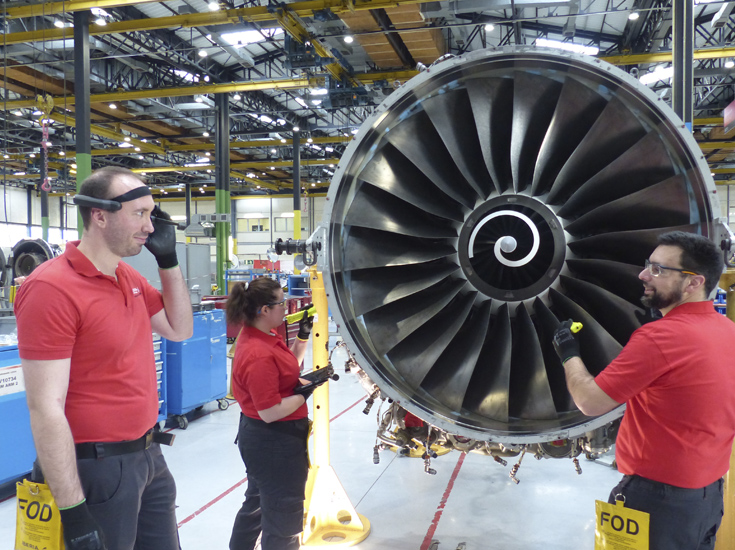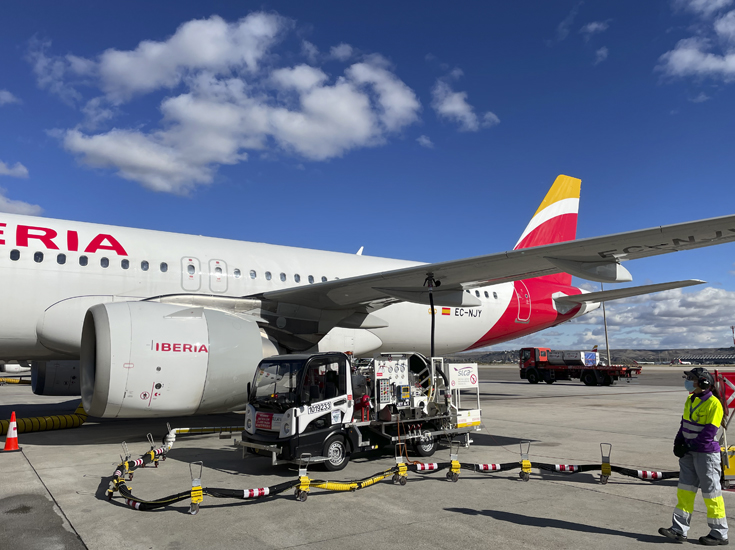Our chief environmental objective is to achieve sustainable and efficient growth, surpassing the targets specified by IATA (International Air Transport Association) for the airline industry, with a focus on achieving climate neutrality by 2050 by means of the following projects:
Fleet replacements
Iberia is acquiring the most efficient, advanced, and silent aircraft for its fleet: the Airbus A350 and the A320neo. The A350-900s are from the latest generation of aircraft and boast fuel consumption and CO2 emissions as much as 35% lower than those they are replacing, while the A320neo emits 15% less CO2 and 50% less nitrogen oxides.


Digitalisation
The introduction of the Electronic ipads and digital publications has contributed to paper reduction, increase their efficiency and reduce waste. Additionally, the ability to electronically sign off work cards will cut a significant amount of administrative time in MRO operations.
By eliminating time in administrating paper, we can lead to a direct improvement in profitability since more time can be spent working on the aircraft instead of awkward paper.
Paperless transformation in all hangars, engine and components shops while assuring aviation safety, security, and environmental sustainability.
Internal digitization and reducing our usage of natural resources like energy, paper and water are important to us, and we have made continuous improvements in our MRO facilities.
Electric power from renewable sources at all Iberia installations
Since April, 2019, all electrical energy consumed by Iberia on its own properties comes from renewable sources with zero CO2 emissions.
Iberia installed a solar plant on its 20,000 sq. m aircraft engine maintenance shop to power the company’s hangars, workshops, and offices at the Spanish airline’s Madrid airport MRO facilities.
Generating 80 million KW/h – enough to power 800 homes – and eliminating 32,000 tonnes of CO2 emissions during its lifetime, Iberia’s first major infrastructural energy efficiency project is added to earlier initiatives to reduce air pollution both in the air and on the ground.
The facility will use 5,374 solar modules to produce a peak of 2,000 KW, for a total of up to 2.7 million KW/h each year. Each panel generates up to 335 watts at peak times, with an efficiency rating of some 20%. A monitoring system will feature displays showing real-time energy output to employees and visitors.
The project is in keeping with the EU’s Green New Deal initiative, approved at the end of 2019, and will pay for itself in energy savings.
Iberia plans to continue to work with Getting Greener over the next four years to replace inefficient equipment and make other changes to help the company reduce both energy costs and its carbon footprint

More efficient and environment-friendly lighting for Iberia hangars
A project to replace conventional lighting with an LED-based system in Iberia’s Madrid airport hangars and workshops was launched in 2017. The new systems are now operational in the main workshop building and hangars 4, 5, 6, and 7. The project is expected to reduce energy consumption by nearly 1.5 million KWh per year.

More efficient ground equipment
Iberia’s Maintenance internal combustion ground vehicles has been replaced by electric powered ones, leading to a substantial reduction in fossil fuel use and exhaust emissions. To the same end, catalytic converters and telemetry tools are being installed.
It is one of a series of moves by Iberia to achieve its goal of zero net emissions by 2050.
2020 AVIATOR
Iberia is one of 17 partners in this project, led by Spain’s aerospace technology agency INTA, to study aircraft emissions with a view to developing cleaner and more efficient engines. It is funded by the EU’s Horizon 2020 research and innovation programme and Canada’s National Research Centre.
Sustainable aviation fuels
Iberia, as part of the IAG Group, has committed to powering 10% of its flights with sustainable aviation fuel by 2030.
Sustainable aviation fuels have the same characteristics and performance as conventional aviation fuel (Jet Fuel A1), but are based on the use of non-fossil raw materials for their production. In addition, they are an indispensable tool for reducing the sector’s emissions in the short and medium term, as their use has been shown to reduce total life-cycle CO2 emissions by up to 80% compared to fossil fuels.

